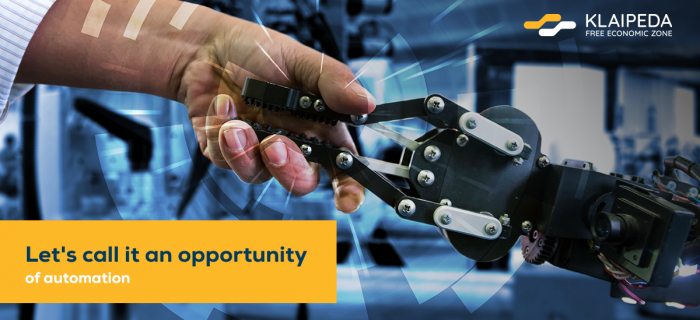News & Events
Watch our activity in one place
High Risk of Job Automation in Lithuania Provides an Academic Opportunity

42% of jobs in Lithuania are at high risk of automation by 2030, a new report by PwC reveals. This is the third biggest number among the OECD countries. However, the report suggests that the job losses from automation are likely to be broadly offset by job gains arising from new technologies like AI and robotics, and so, Eimantas Kiudulas, the CEO of Klaipeda FEZ, believes that automation could become a major field of research and specialization at Klaipeda’s universities and colleges.
PwC’s ‘International analysis of the Potential Long Term Impact of Automation’ also suggests that transportation, storage and manufacturing, historically key industries in Lithuania, are the most prone to automation: some 43-51% of jobs are at risk of automation in these fields, as opposed to 20-35% in most other industries.
PwC’s analysts claim that AI, robotics and related technologies show huge potential to boost productivity and create new and better products and services for businesses. In fact, investment in AI and robotics could contribute as much as 14% to global GDP by 2030. Another survey has revealed that 52% of CEOs worldwide are already exploring the benefits of machines and humans working together.
However, benefits for businesses go hand in hand with challenges for the current and future workforce. The report states that there already is a significant need for increased investment in education and skills to help people adapt to technological change throughout their careers under current automation circumstances and prospects. Governments, businesses, trade unions and other organisations will all need to play their part here in helping people to adapt to the new technologies. This will include training and retraining people in softer skills, such as creativity, problem solving and flexibility. On-the-job training will play an important part through degree apprenticeships that offer a mix of theoretical study and practical experience.
‘It is also important to recognise that concerns about the possible loss of existing jobs should not lead countries to miss out on opportunities to lead the way in developing these new technologies. If governments and businesses in one country do not invest in them, then they will just be developed elsewhere. Unless a country blocks itself off from global trade and investment, which history shows would be extremely damaging economically in the long run, the technologies will still come to all countries over time, so it is better to be at the forefront of this global race,’ PwC report states.
Eimantas Kiudulas says that these numbers don’t come as a surprise because most companies from Klaipeda FEZ are already involved in some kind of process automation, robotics and data analytics and are further researching the opportunities that lie in this area. However, as the true impact on jobs is forecasted to start gaining momentum from 2023 onwards, both people and governments should react to these trends immediately.
‘While these numbers may look menacing for people at first glance, I see a tremendous opportunity here. I believe that given Klaipeda’s historical expertise in manufacturing, local universities and colleges should and will gear their programmes towards automation, as well as the AI and robotics. This is very much in line with Klaipeda’s Blue Economy strategy, which was announced by the city municipality last year, as automation usually leads to smaller environmental footprint. At the same time, our free zone and companies operating here are already partnering with local universities in various research projects. I can promise that we will provide much more support as a sandbox or a partner for researchers and students once these programs appear on the academic curriculum,” E. Kiudulas said.
You can download PwC’s full report here.
